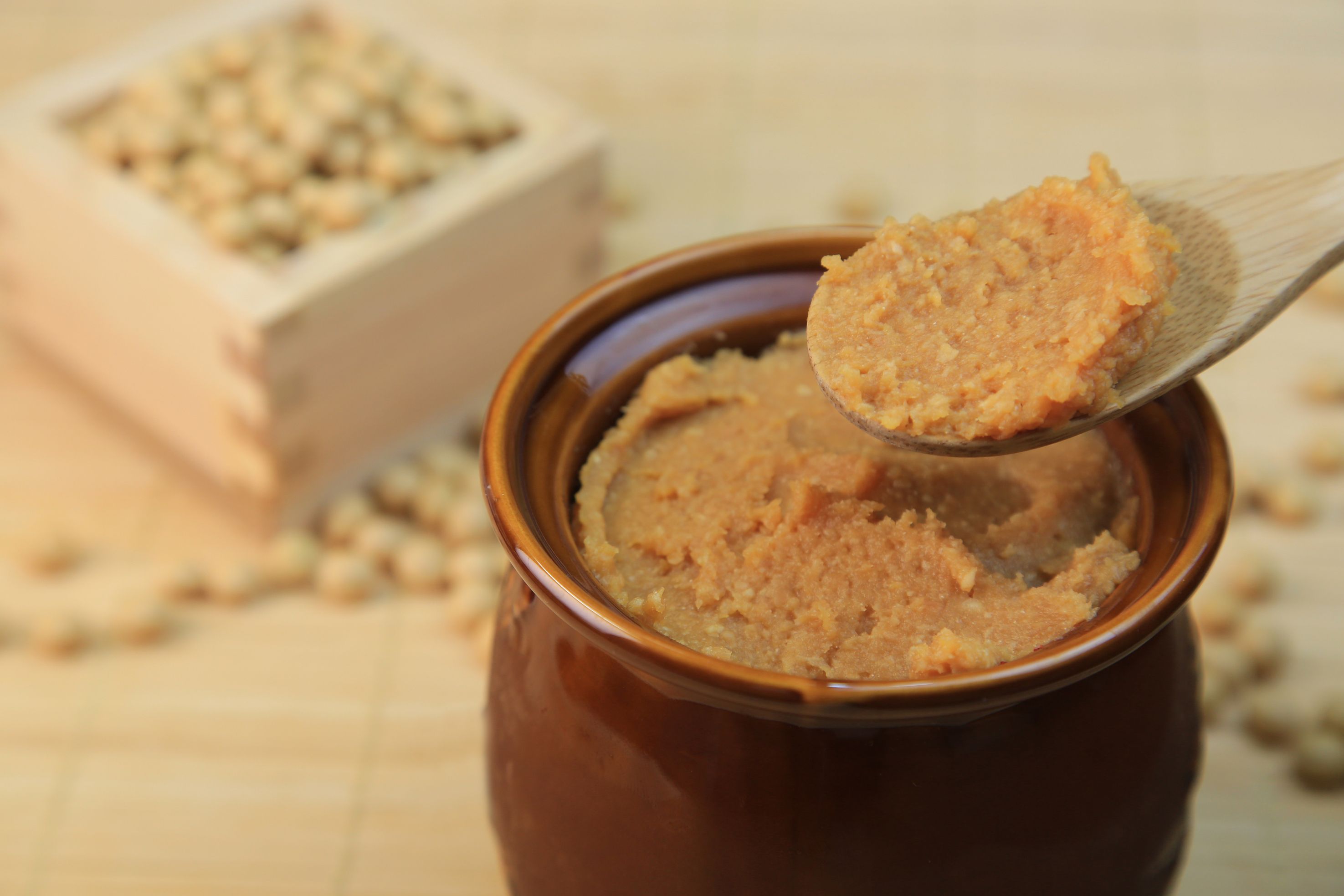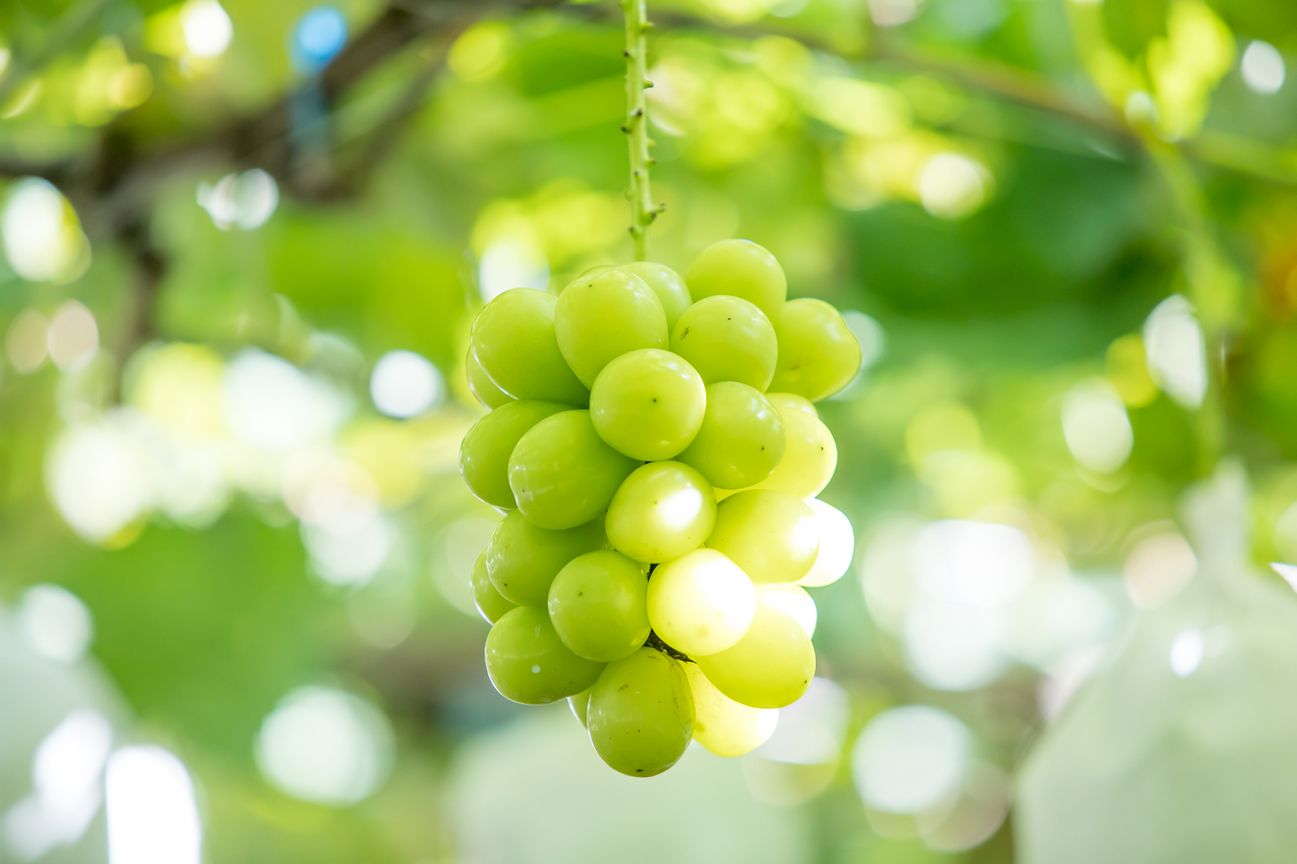
Visiting the Birthplace of the Prized Japanese Fruit, the Shine Muscat
Photo courtesy of Agbell.
In Japan, a country rich in nature, different regions grow a variety of high-quality crops suited to their local climates. One such region is Yamanashi Prefecture. Seated within a basin, the prefecture produces an abundance of fruits such as grapes, peaches, and plums, boasting both the largest acreage and the largest volume of grape production nationwide. Viticulture has a lengthy history, and it is said that grapes have been produced since about 1,300 years ago. The most widely produced variety in Yamanashi at present is the Shine Muscat, which can be eaten skin and all. We spoke with Keisuke Maruyama of Agbell, who is a young viticulturist helping to bring these Shine Muscat grapes to consumers abroad, about the secret to their great taste.
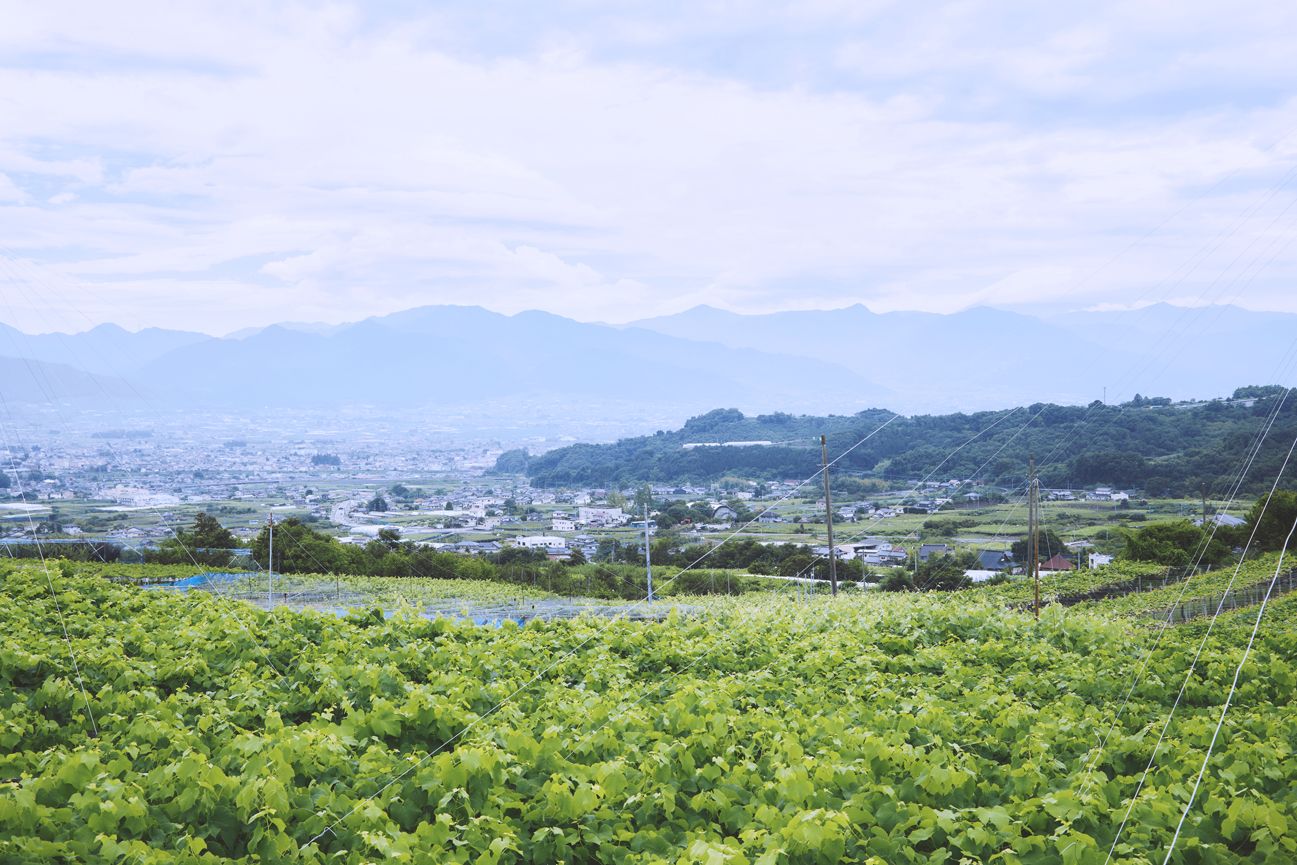
The Kofu Basin is characterized by its well-draining soil. It gets the most hours of sunlight in Japan, and the temperature difference between day and night makes it an ideal region for cultivating fruit.
“It’s been 17 years since the Shine Muscat variety was developed in Japan. Even though it has a relatively short history, I think the reason it’s gotten this popular even overseas is because it’s a high-quality variety to begin with. That’s all because we’re blessed with such favorable weather and climate. The Kofu Basin gets the most hours of sunlight in all of Japan, and the large temperature difference from day to night helps concentrate the sweetness in the fruit. On top of this, the soil is fertile and the spring water that flows down from the surrounding mountains is of outstanding quality. We have everything we need here to produce delicious fruit. All we need to do is grow them with care and our whole hearts.”
This is according to Keisuke Maruyama, a young leader driving the cultivation of Shine Muscat in Yamanashi Prefecture as a third-generation grape farmer. After gaining experience working in a different industry, he took over the family business and began farming in 2017 with the goal of becoming a leading producer of Shine Muscat. He went on to found the company Agbell in 2020, which was recognized as an Ambassador of the Ministry of Agriculture, Forestry and Fisheries (MAFF)’s Global Farmers / Fishermen / Foresters / Food Manufacturers Project (GFP) for its excellence in April 2022.
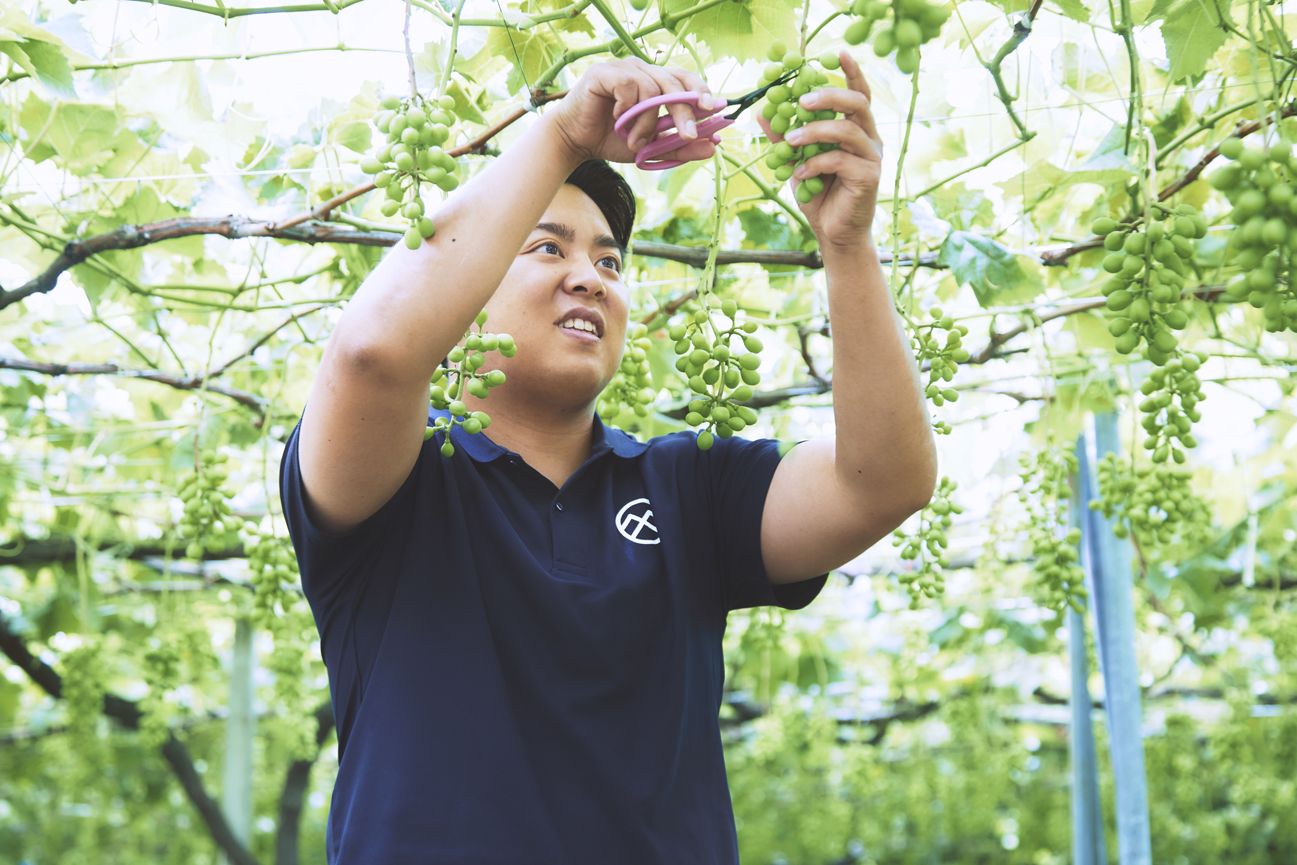
Mr. Maruyama thinning out Shine Muscat grapes.
One Shine Muscat cluster can bear as many as 100 grapes, which are thinned down to 30 about two months before harvest. After that, a paper bag coated with a water-repellent finish is placed over the cluster. The bag is meant to prevent pest damage and pesticide exposure, and is also said to be effective at maintaining the yellow-green color of the skin and reducing blemishes caused by physiological disturbances.
The Shine Muscat is harvested from around mid-August to September. The branches bearing clusters turn from green to brown, a telltale sign that they are ready to harvest. At Agbell, the company has established their own regulations for shipping Shine Muscat grapes.
“We maintain a minimum sugar content of at least 17°. Each grape should also be at least 3 cm big and weigh about 20 grams. We ask our neighboring affiliate farms to follow these regulations too. One of Agbell’s advantages is that we have our own sorting plant as well. We’re able to inspect Shine Muscat grapes coming from our partners at our own facility, so we can guarantee the quality of our product.”
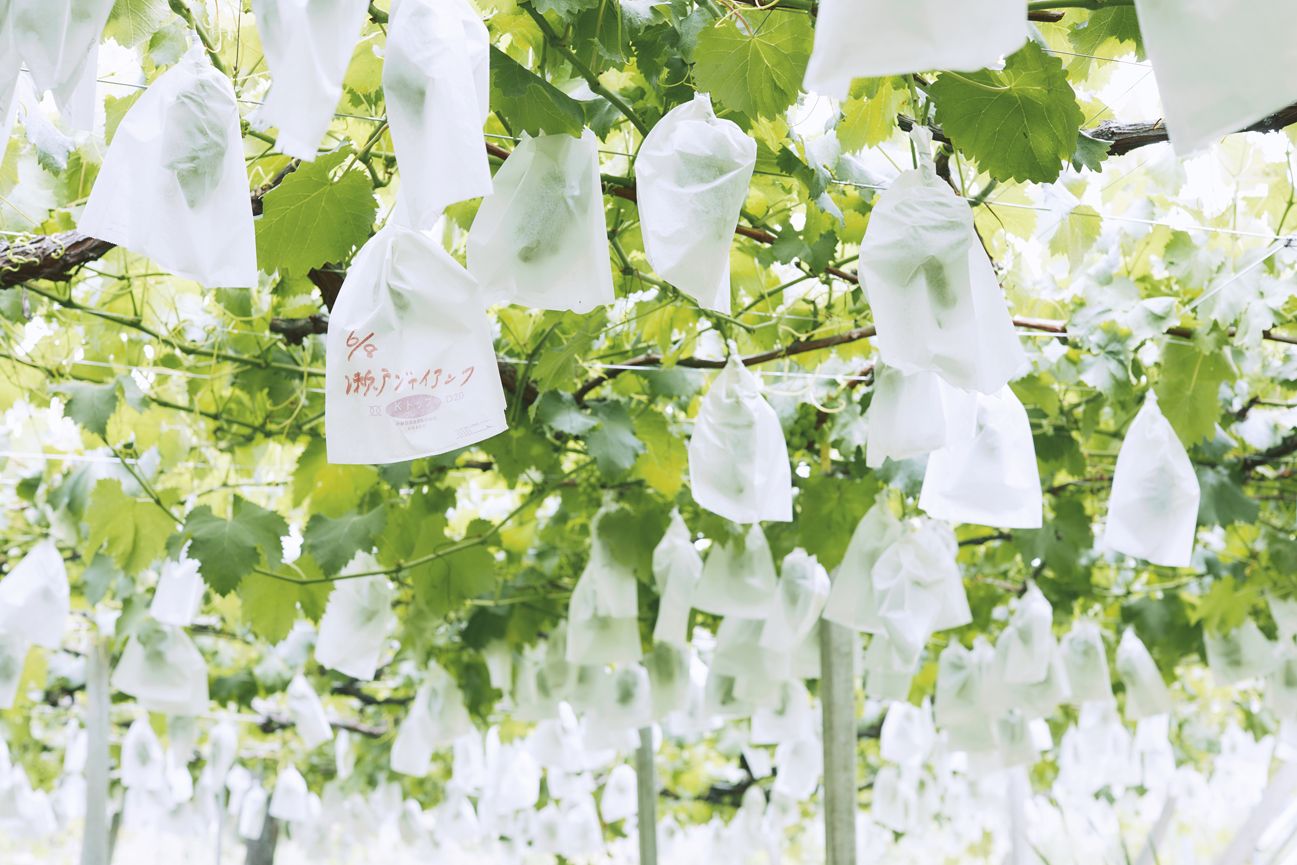
Bagging is one of Japan’s unique cultivation methods. The bag with the variety handwritten on it marks a cluster undergoing the experimental breeding process, explained shortly below.
In the two years since launch, Agbell has acquired 14 times the acreage it had at the start and boasts a tremendous production volume. The Shine Muscat grapes they produce are shipped half domestically and half internationally. Ordinary distribution routes see producers consign product sales to wholesalers, and most of the time the producers have no way of knowing what happens to their product thereafter. Mr. Maruyama, however, has broken away from that convention, the norm up until now, and taken a stance of promoting his product directly to buyers.
“The products I make myself, I venture out to sell myself, be it here in Japan or overseas. I don’t mean to discount the route my predecessors have taken, of course. But still, the benefits I’ve felt we get from communicating with buyers directly have been significant. First of all, you need to be able to answer any question confidently right there on the spot, be it about the cultivation area, the environment the grapes are grown in, our non-negotiable commitment to quality, or the cultivation methods we’ve developed over a long period of time. We get a lot of questions especially at trade fairs overseas, like, “What sort of place is it that you grow your grapes in?” “How long does it take from harvest to shipment?” or “Are you able to provide grapes of a uniform size?” It’s times like these that we’re able to gain a customer’s trust by giving the sort of swift response only the producer can, or agree to meet a customer’s specifications on the spot, which has helped us win contracts in one fell swoop on occasion. Above all, I appreciate getting to ask questions and get a clear idea of what’s expected of me.”
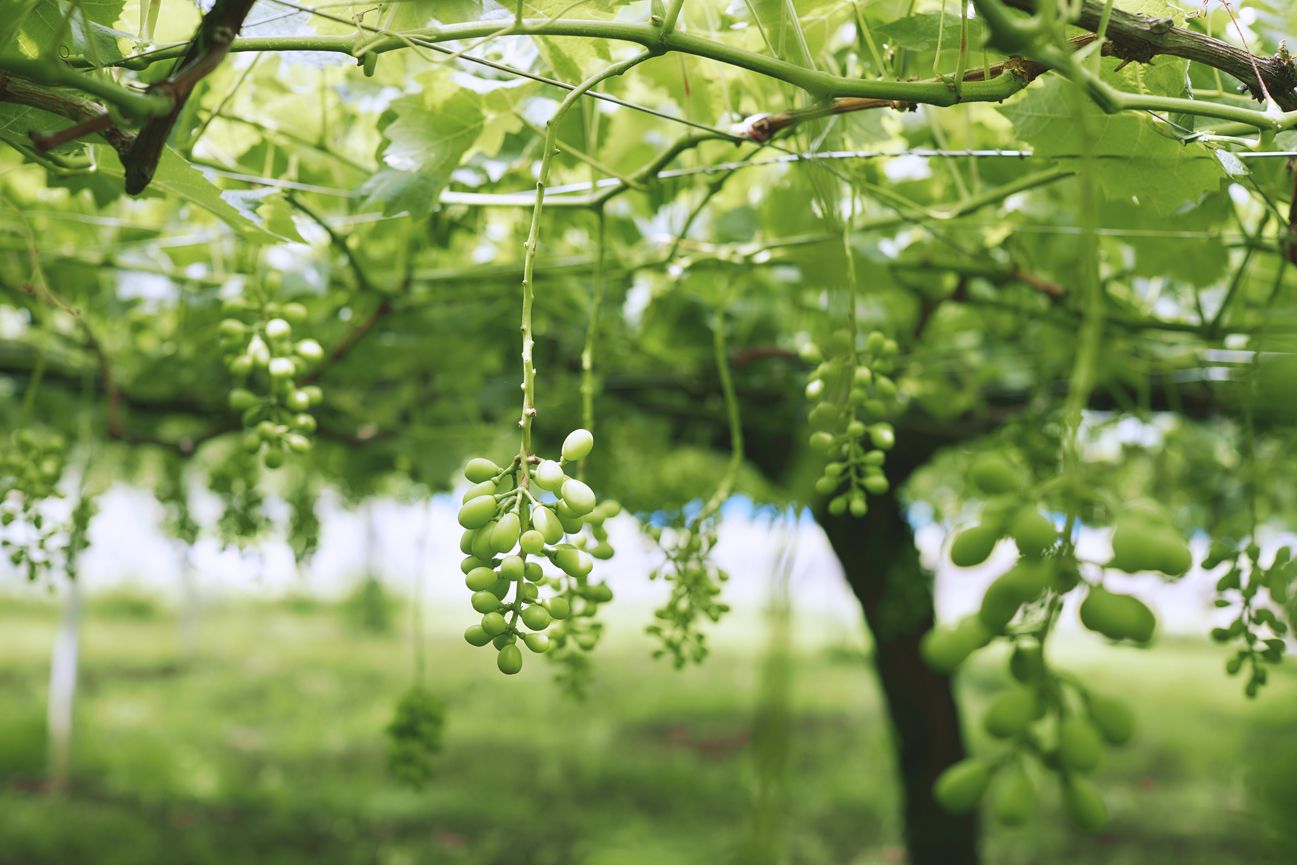
The gorgeous grapes growing in the vineyard provide a spectacular view, worthy of their nickname as the “jewel of fruits.” At this stage, Shine Muscat grapes have a strong acidity that is reminiscent of citrus fruits. Producers allow their sweetness and aroma to slowly concentrate until it is time for harvest.
Mr. Maruyama says he often hears that the quality and taste of Japanese-grown Shine Muscat grapes are the main reasons why they are so highly regarded overseas. Although the COVID-19 pandemic slowed down operations for some time, Agbell has already received new orders from department stores and Japanese supermarkets in Taiwan, Macau, and Thailand, as well as from the UAE (Dubai) and Vancouver, Canada this year.
“In 2020, we held our own Agbell Shine Muscat fair in Taiwan. We weren’t able to visit in person because of COVID-19, but thanks to influencers spreading the word on social media, our Shine Muscat grapes apparently sold out in no time for 15,000 yen per cluster, though there weren’t many in terms of quantity. Since we put QR codes on our products, we’ve gotten messages directly from customers saying how wonderful our grapes were and that they were more delicious than any they’d ever tasted before. We had to communicate via translation, but I was just happy to have been recognized globally.”
One of the most appealing aspects of Agbell’s Shine Muscat grapes is their unparalleled freshness. “We ship all of our exports by air, so they reach their destination in about two days. We harvest our grapes at their very best, but sometimes customers dictate when they get exported. We’ve created a system that can keep them fresh for about eight weeks in refrigerated containers for such instances, and we’re continuously devising new ways to preserve their freshness.”
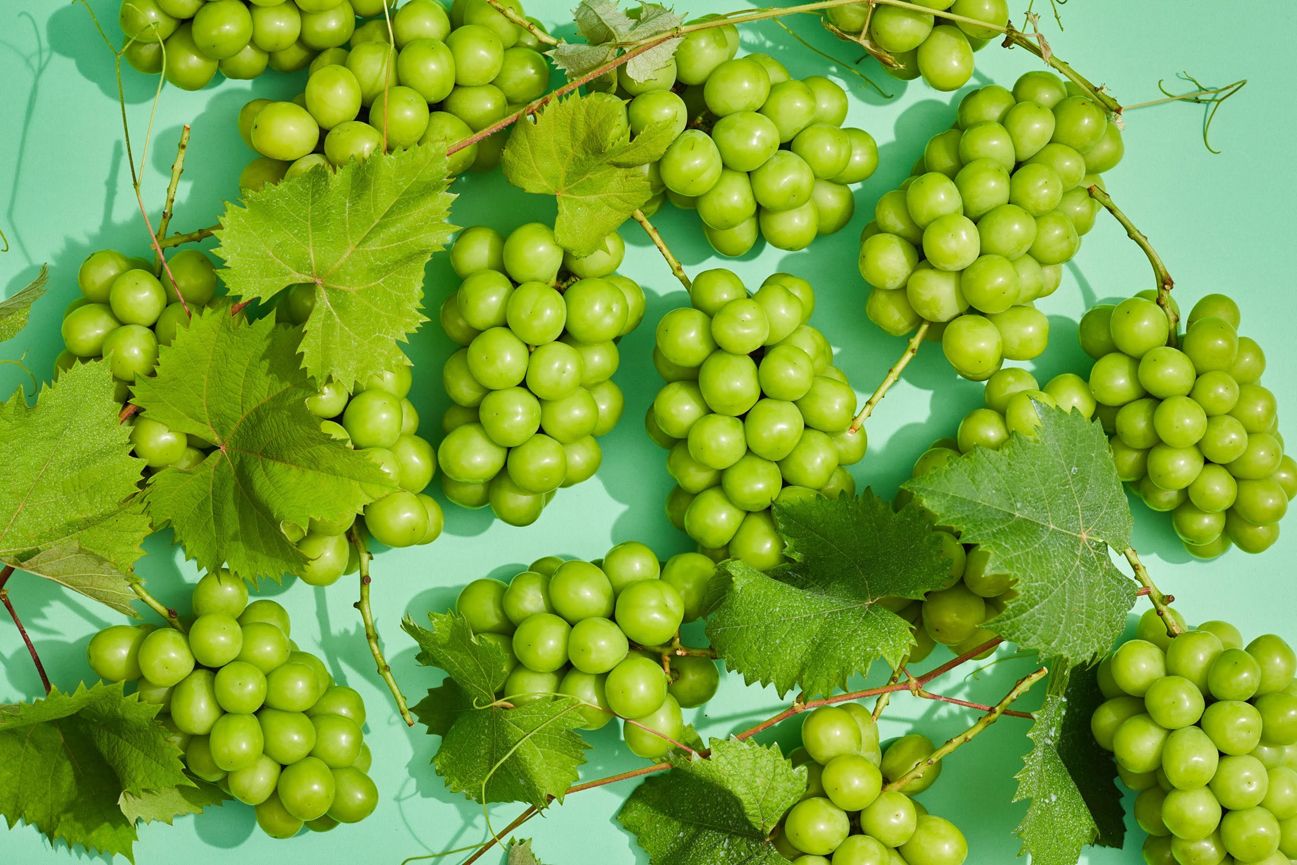
Freshly harvested grapes are delivered straight to overseas markets, so they are exceptionally delicious! Photo courtesy of Agbell.
Many people also seem to be enticed by Japan-grown Shiny Muscat after visiting the country. “Tourists, especially tourists from the Asia region, often buy fruit from the delicatessens at department stores to eat at their hotels. They’re unable to forget that mouthwatering experience, and they come to us asking us to sell our grapes in their home countries as well.”
When asked for tips on how to best enjoy Shine Muscat grapes, Mr. Maruyama had this to say: “When handling the grapes, we don’t recommend chilling them and letting them return to room temperature repeatedly. I think they taste best if you chill them an hour or so before serving.”
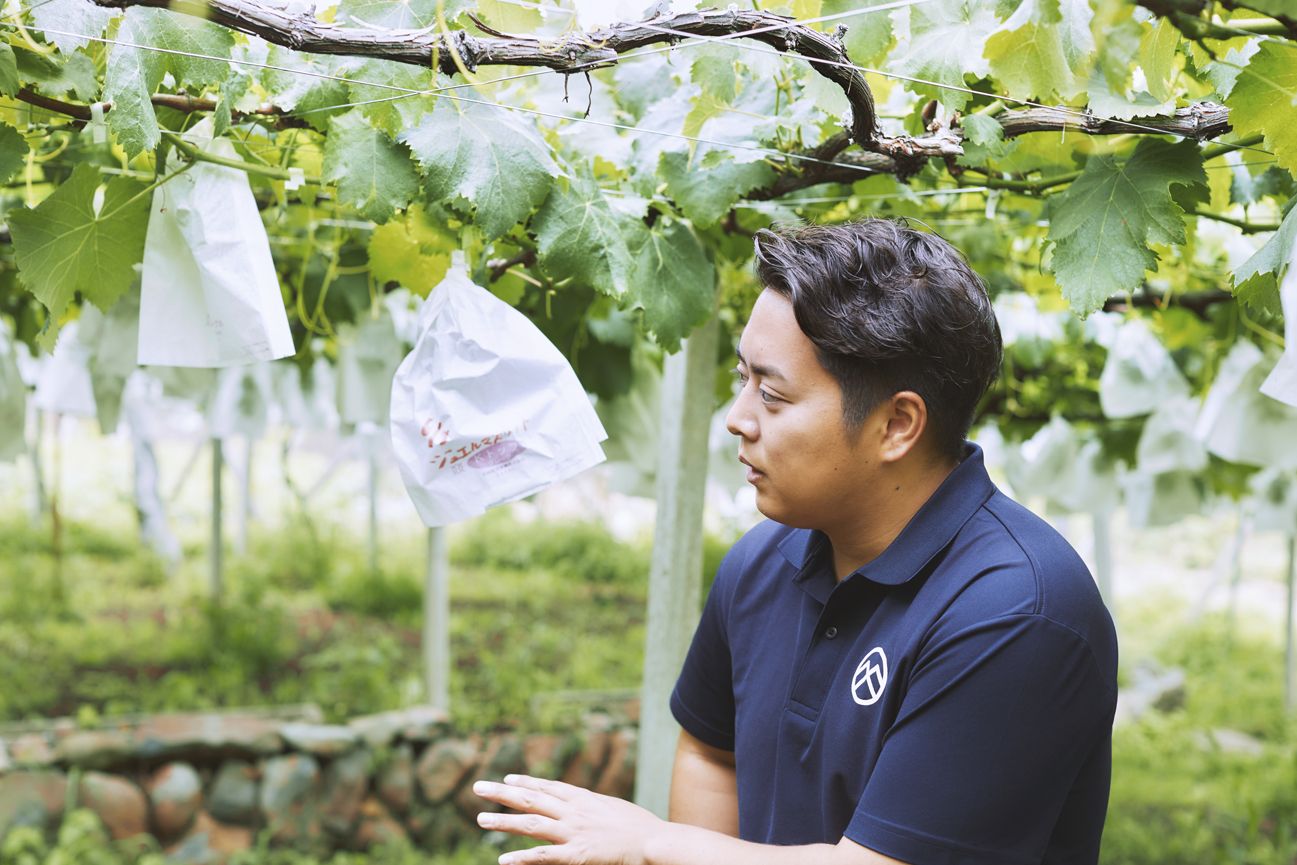
Mr. Maruyama agreed to be interviewed just as busy season was approaching.
“Right now, Shine Muscat is treated as a high-end product in export markets, but if we’re able to adjust the price down a little bit more by improving our systems of production and distribution structure, I think we can expand our customer base. Also, I don’t know how many years it will take, but I’m hoping to create a new variety from the Shine Muscat. We’ve already begun the breeding process in which we experiment with cross-breeding a number of different varieties in different combinations.
We’re also actively moving forward with product development for our out-of-spec grapes to help eliminate food loss. There are relatively minimal losses when it comes to grapes, but when grown at a scale like ours, loss inevitably occurs. Our out-of-spec grapes are still delicious, and so by collaborating with brands that produce sweets, we can transform them into purees, jams, dried fruit, and other processed products for sale so that they don’t go to waste.”
Mr. Maruyama’s challenge has only just begun. Why not try a Shine Muscat grape, cultivated in a unique Japanese climate by earnest farmers, and experience its special taste for yourself?
Reference: Japan Fruit and Vegetables Export Promotion Council
Text: Tomomi Aoyama (Courageous Navy); Photography: Aya Oshima
Yamanashi City, Yamanashi Prefecture
Agbell
Established in 2020 by Keisuke Maruyama, a third-generation viticulturist whose family has been growing grapes in Yamanashi Prefecture for over 60 years. The company name is a combination of the words “agriculture” and “bell,” representing a desire to “ring the bell signaling a new age of agriculture.” While carrying on cultivating the family farm in the spirit of his ancestors, Mr. Maruyama is also taking on the challenge of developing his own unique cultivation methods through trial and error. Moreover, he is working to design a new agricultural business model and train the next generation of young farmers. https://agbell.co.jp






